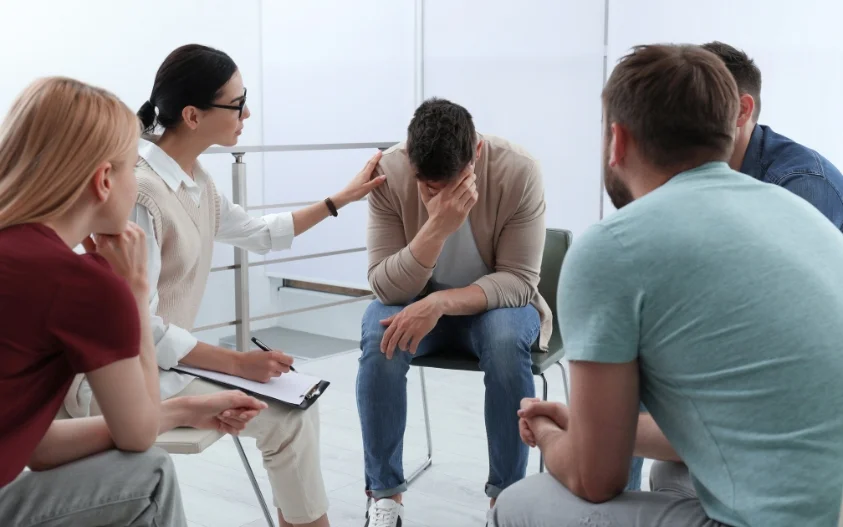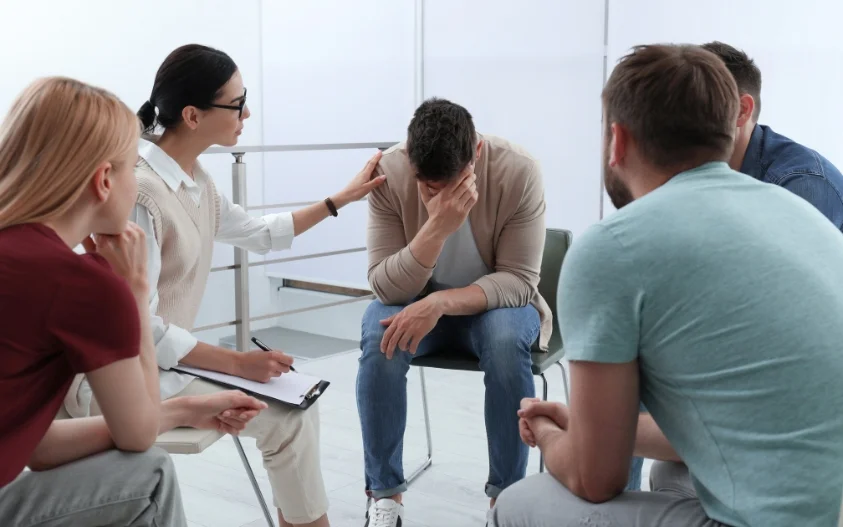24/7 Helpline:
(866) 899-221924/7 Helpline:
(866) 899-2219
Learn more about Opioid Rehab centers in Cullman County
Opioid Rehab in Other Counties

Other Insurance Options

UMR

WellPoint

Ceridian

Self-pay options

Excellus

Lucent

EmblemHealth

Health Choice

Highmark

PHCS Network

Access to Recovery (ATR) Voucher

United Health Care

American Behavioral

BlueShield

CareFirst

Covered California

Anthem

Aetna

WellCare Health Plans

Coventry Health Care

The Bridge
The Bridge provides alcohol and drug rehab services to adolescents and adults in Cullman, Alabama. T...

Wellstone – Cullman Area Mental Health
Wellstone–Cullman Area Mental Health, in Cullman, Alabama, provides outpatient addiction recovery se...

Haralson Behavioral Health Services
Haralson Behavioral Health Services is a public rehab located in Bremen, Georgia. Haralson Behaviora...

Pioneer Health Resources
Pioneer Health Resources is a private rehab located in Garden City, Idaho. Pioneer Health Resources ...

Mountain View Behavioral Health
Mountain View Behavioral Health is a private rehab located in Garden City, Idaho. Mountain View Beha...

Compass Behavioral Health
Compass Behavioral Health is a public rehab located in Garden City, Kansas. Compass Behavioral Healt...

Finney County Community Services Center – Youth Services
Finney County Youth Services provides intervention, prevention, rehabilitation, education, and behav...

Joppa Health Services
Joppa Health Services is a private rehab located in Joppa, Maryland. Joppa Health Services specializ...

Garden City Hospital’s Center for Counseling
Garden City Hospital’s Center for Counseling is a private rehab located in Garden City, Michigan. Ga...

Mercy Medical Center – Family Counseling
Mercy Medical Center – Family Counseling is a private rehab located in Garden City, New York. Mercy ...

Health Recovery Services – Chemical Dependency
Health Recovery Services - Chemical Dependency is a non-profit business and Drug Free Workplace serv...

Health Recovery Services – Mental Health
Health Recovery Services - Mental Health is a non-profit business and Drug Free Workplace serving th...

Bear River Mental Health Services – Outpatient
Bear River Mental Health Services – Outpatient is a private rehab located in Logan, Utah. Bear River...

Renaissance Ranch
Renaissance Ranch - N. Main St. offers outpatient treatment for individuals with alcohol and/or subs...

Bear River Health Department – Substance Abuse
Bear River Health Department – Substance Abuse is a public rehab located in Garden City, Utah. Bear ...

Bear River Health Department – Division of Substance Abuse
Bear River Health Department - Division of Substance Abuse is a public rehab located in Logan, UT. B...

Bear River Mental Health Services – Bear River House
Bear River Mental Health Services – Bear River House is a private rehab located in Logan, Utah. Bear...

Prestera Center
Prestera Center is a private rehab located in Logan, West Virginia. Prestera Center specializes in t...
































































Cullman County Treatment Center
Cullman County Treatment Center is an outpatient drug and alcohol rehab for adults in Cullman, Alaba...

Lighthouse
Lighthouse is a non-profit rehab located in Cullman, Alabama. Lighthouse specializes in the treatmen...

City on a Hill
City on a Hill is a non-profit rehab located in Garden City, Kansas. City on a Hill specializes in t...

Saint Catherine Hospital – Behavioral Health Unit
Saint Catherine Hospital – Behavioral Health Unit is a private rehab located in Garden City, Kansas....

Atrium Rehabilitation
Atrium Rehabilitation is a private rehab located in Garden City, Michigan. Atrium Rehabilitation spe...

Alcoholics For Christ – Merriman Road Baptist Church
Alcoholics For Christ - Merriman Road Baptist Church is located in Garden City, Michigan. Alcoholics...

Growth Works
Growth Works is situated in Garden City, Michigan, an addiction treatment center specializing in out...

The Institute for Research and Treatment of Addictive Disorders
The Institute for Research and Treatment of Addictive Disorders is a private rehab located in Logan,...

Utah State University – Psychology
Utah State University – Psychology is a private rehab located in Logan, Utah. Utah State University ...

Family Institute of Northern Utah
Family Institute of Northern Utah is a private rehab located in Logan, Utah. Family Institute of Nor...

Appalachian Health Services
Counseling Services provided at this location by Appalachian Health Services, a Division of Ohio Val...
















































































